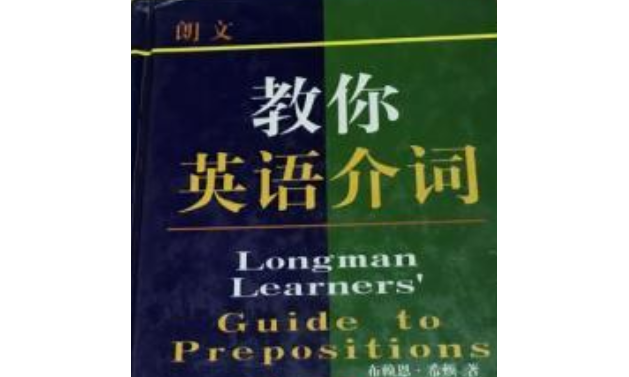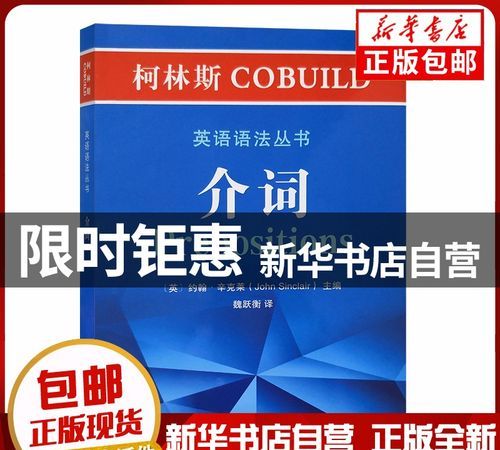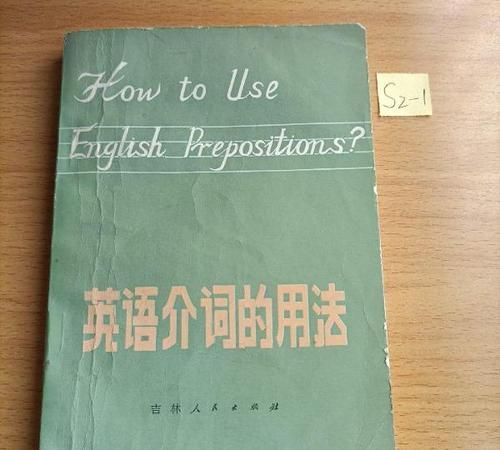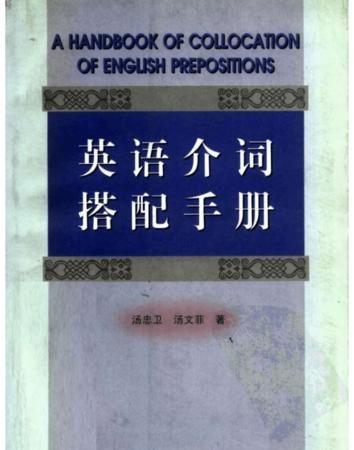本文目录
英语专业学生必读的英语书籍
英语专业是培养具有扎实的英语语言基础和比较广泛的科学文化知识,能在外事、经贸、文化、新闻出版、教育、科研、旅游等部门从事翻译、研究、教学、管理工作的英语高级专门人才的学科。下面,我为大家分享英语专业必读的书籍,希望对大家有所帮助!
基础英语类:
1 英语短文阅读菁华 张宜 马鸿 大连理工大学出版社 18.00
2 英汉介词/副词搭配词典 钱建立 刘立群 大连理工大学出版社 26.00
3 现代英语佳作赏析(共四册) 不同的作者 西安交通大学出版社 45.00
4 中式英语之鉴 JOAN PINKHAM 外语教学与研究出版社 22.90
5 实用英语表达技巧 方亚中 武汉大学出版社 17.00
6 全球热点话题英语选读 木村哲也 外文出版社 14.00
7 实用分类英语惯用法 刘学明 湖南教育出版社 15.20
8 英语听说诵读实用文选365篇 周淑杰 天津大学出版社 20.00
翻译词典类:
1 新汉英分类口译词典 世界图书出版公司 28.00
2 外事工作人员英语常用分类词汇 (绝版) 北京出版社 1.10
3 汉英外事工作常用词汇 外文出版社 48.00
4 汉英分类翻译词典 大连理工大学出版社 58.00
翻译类:
1 汉英词语翻译探微 杨全红 汉语大词典出版社 12.00
2 英汉汉英段落翻译与实践 蔡基刚 复旦大学出版社 15.00
3 中级英语笔译模拟试题精解 齐乃政 中国对外翻译出版公司 22.00
4 汉译英口译教程 吴 冰 外语教学与研究出版社 19.90
5 实用英汉翻译教程 申雨平 戴宁 外语教学与研究出版社 13.90
6 英美文化与英汉翻译 汪福祥 伏力 外文出版社 11.00
7 汉译英实用技能训练 孙海晨 外文出版社 16.80
8 高级翻译评析 王大伟 孙艳 上海交通大学出版社 14.50
9 同声口译金话筒 侯国金 大连理工大学出版社 12.00
10 英汉口译实用教程 宋天锡 国防工业出版社 26.00
11 英汉翻译技巧示例 毛荣贵 范武邱 上海交通大学出版社 16.50
12 实用英语口译(英汉)新编 崔永禄 等 南开大学出版社 10.00
13 汉英时文翻译 贾文波 中国对外翻译出版公司 11.00
14 现代汉英翻译技巧 王大伟 世界图书出版公司 21.60
15 汉英语篇翻译强化训练 居祖纯 清华大学出版社 14.00
16 英语口译教程 吴守谦 哈尔滨工程大学出版社 17.00
17 按实例学英语 刘慎军 等 北京工业大学出版社 11.00
18 汉英口译入门 李长栓 外语教学与研究出版社 17.90
19 中国时尚热点新词速译 朱诗向 对外经济贸易大学出版社 20.00
20 英汉翻译综合教程 王宏印 辽宁师范大学出版社 19.00
21 实用科技英语翻译讲评 范武邱 外文出版社 13.00
22 实用口译手册 钟述孔 中国对外翻译出版公司 12.00
23 英汉翻译基础 古今明 上海外语教育出版社 16.50
24 教你如何掌握汉译英技巧 陈文伯 世界知识出版社 17.00
25 英汉翻译手册 惆西 董乐山 等 商务印书馆国际有限公司 18.00
26 英汉同声传译 张维为 中国对外翻译出版公司 12.00
27 高级口译教程 梅德明 上海外语教育出版社 26.30
28 高级翻译教程 孙万彪 王恩铭 上海外语教育出版社 21.00
29 常用英语习语翻译与应用 韩晓玲 青岛海洋大学出版社 32.00
30 研究生英语翻译 陶友兰 查国生 复旦大学出版社 28.00
31 高级汉英/英汉口译教程(上下册) 王桂珍 华南理工大学出版社 50.00
32 实用英语口译教程 冯建忠 译林出版社 39.50
33 (名字忘了,我复印的) 庄绎传 不祥 不祥
34 英汉口译实练 冯建忠 译林出版社 37.00
35 英汉翻译练习集(绝版) 庄绎传 中国对外翻译出版公司 0.80
36 汉英政治经济词汇 内部资料
37 最新汉英外交政治词汇 内部资料
38 英汉翻译教程(自考教材) 庄绎传 外语教学与研究出版 17.90
39 口译与听力(自考教材) 杨俊峰 辽宁大学出版社 13.00
40 英汉互译实践与技巧 许建平 清华大学出版社 20.00

英语介词,动词,副词,形容词用法
介词:
一、概念:
介词是一种用来表示词与词, 词与句之间的关系的词。在句中不能单独作句子成分。介词后面一般有名词代词或相当于名词的其他词类,短语或从句作它的宾语。介词和它的宾语构成介词词组,在句中作状语,表语,补语或介词宾语。并且在定语从句“介词+whom/which”的结构中,不能用that 代替whom/which。She is a good student from whom we should learn.
介词分为时间介词.地点位置方向介词.方式介词.原因介词和其他介词
[编辑本段]二.相关知识点精讲
介词口诀:自从以当为按照,由于对于为了到;和跟把比在关于,除了同对向往朝;用在名词代词前,修饰动形要记牢。.
[编辑本段]1.表示地点位置的介词
1)at ,in, on, to,for
at (1)表示在小地方; (2)表示“在……附近,旁边”
in (1)表示 在大地方; (2)表示“在…范围之内”。
on 表示毗邻,接壤,“在……上面”。
to 表示在……范围外,不强调是否接壤;或“到……”
2)above, over, on 在……上
above 指在……上方,不强调是否垂直,与 below相对;
over指垂直的上方,与under相对,但over与物体有一定的空间,不直接接触。
on表示某物体上面并与之接触。
The bird is flying above my head.
There is a bridge over the river.
He put his watch on the desk.
3)below, under 在……下面
under表示在…正下方
below表示在……下,不一定在正下方
There is a cat under the table.
Please write your name below the line.
4)in front [frant]of, in the front of在……前面
in front of…意思是“在……前面”,指甲物在乙物之前,两者互不包括;其反义词是behind(在……的后面)。
There are some flowers in front of the house.(房子前面有些花卉。)
in the front of 意思是“在…..的前部”,即甲物在乙物的内部.反义词是at the back of…(在……范围内的后部)。
There is a blackboard in the front of our classroom.
我们的教室前边有一块黑板。
Our teacher stands in the front of the classroom.
我们的老师站在教室前.(老师在教室里)
5)beside,behind
beside 表示在……旁边
behind 表示在……后面
2.表示时间的介词
1)in , on,at 在……时
in表示较长时间,如世纪、朝代、时代、年、季节、月及一般(非特指)的早、中、晚等。
如 in the 20th century, in the 1950s, in 1989, in summer, in January, in the morning, in one’s life , in one’s thirties等。
on表示具体某一天及其早、中、晚。
如on May 1st, on Monday, on New Year’s Day, on a cold night in January, on a fine morning, on Sunday afternoon等。
at表示某一时刻或较短暂的时间,或泛指圣诞节,复活节等。
如at 3:20, at this time of year, at the beginning of, at the end of …, at the age of …, at Christmas, at night, at noon, at this moment等。
注意:在last, next, this, that, some, every 等词之前一律不用介词。如:We meet every day.
2)in, after 在……之后
“in +段时间”表示将来的一段时间以后;
“after+段时间”表示过去的一段时间以后;
“after+将来点时间”表示将来的某一时刻以后。
3)from, since 自从……
from仅说明什么时候开始,不说明某动作或情况持续多久;
since表示某动作或情况持续至说话时刻,通常与完成时连用。
4)after, behind 在……之后
after主要用于表示时间;
behind主要用于表示位置。
时间名词前介词用法口诀
年前周前要用in
具体日子却要禁
遇到几号要用on
上午下午又是in
要说某日上下午
用on换in记清楚
午夜黄昏用at
黎明用它也不错
at用在时分前
说“差”可要用上to
说"过''要用past
3.表示运动方向的介词:
across, through 通过,穿过
across表示横过,即从物体表面通过,与on有关;
through穿过,即从物体内部穿过,与in有关。
4.表示“在……之间”的介词:
between, among
between指在两个人或两个事物之间;
among指在三个或三个以上的人或事物之间。
5.表示其他意义的介词
1)on ,about 关于
on 表示这本书,这篇文章或演说是严肃的,或学术性的,可供专门研究这一问题的人阅读;
about表示内容较为普通,不那么正式。
2)by, with, in 表示方法、手段、工具
by 以……方法、手段或泛指某种交通工具;
with 表示用 …工具、手段,一般接具体的工具和手段;
in 表示用…方式,用…语言(语调、笔墨、颜色)等;
3)except, besides 除了
except 除……之外,不包括在内;
besides 除……之外,包括在内。
Except Mr. Wang, we went to see the film.(王先生没去)
Besides Mr. Wang, we also wentting to see the film.(王先生也去了)
其它常用介词
介词在英语词汇中所占比例很小,但它们的用法却非常灵活,复杂。下列为常用介词及含义:
1)about 关于,附近,大约,周围,随身.
I have bought a book about Shakespearean.
我买了一本有关莎士比亚的书。
There are about fifteen trees in the picture.
图片里大约有十五棵树。
2)above 在....上,高出,以上,超过,在...上游.
The plane is flying above the clouds.
飞机在云上飞行。
I think the man is about sixty years old.
我想那人有六十多岁了。
3)across 横过,对面,交叉,在...的对面.
Can you swim across the river?
你能游过河吗?
We live across the street.
我们住在街的对面。
4)after 在...后面,依照.
He went home after school.
他放学后就回家了。
Read after me, please.
请跟我朗读。
5)against 撞到,靠着,反对,违背,
The car hit against the tree.
汽车撞了树。
He is standing against the wall.
他靠墙站着。
6)along 沿着,顺着.
They are walking along the river.
他们沿着河行走。
7)among 在...当中.(三者或三者以上)
He is the tallest among them.
他是他们当中个子最高的。
8)around 在...的周围,在...那一边.
They sat around the table talking the news.
他们绕桌而坐谈论新闻。
There is a drugstore around the corner.
拐角处有一家药店。
9)as 作为.
He doesn't like people treat him as a child.
他不喜欢人们把他当小孩子对待。
10)at 在...时刻,在...点钟,在...岁时, 向,在...之中,按...速度,值(卖)...钱, 在...(强调地点)
He always gets up at six in the morning.
他时常早上六点钟起床。
He shot at the bird but missed it.
他向鸟射击,但是没射中。
The car goes at eighty miles an hour.
汽车以每小时八十公里的速度行驶。
11)before 在...的前面(位置),在...之前(时间)
He took a picture before the car.
他在汽车前照了张照片。
He can't finish his work before supper.
晚饭前他完不成工作。
12)behind 在...的后面(位置), 落后于,不如,
迟于,晚于(时间)
Are there any brooms behind the door.
门后有扫帚吗?
All of us are behind him in mathematics.
我们数学都不如他。
13)below 在...之下,低于,
There are four lights below the ceiling.
天花板下面有四盏灯。
The murderer run away below the police's eyes.
杀人犯从警察眼皮底下跑了。
14)beside 在...的旁边,在...之外,与...相比.
He found the body beside the river.
他在河边发现了尸体。
Beside yours, my computer is too slow.
与你的计算机速度相比,我的就慢多了。
15)besides 除...之外, 还有...
We are all here besides Bowe.
除鲍外,我们也都来了。
16)between 在...两者之间,
The relations between the two countries has improved since then.
两国的关系从那以后得到了改善。
17)beyond 在...那边,
The shop you are looking for is beyond the street, you can't miss it.
你要找的商店在街的那边,你不会找不到的。
18)but 除去.
He has nothing but money.
他除钱以外什么都没有。
19)by 被..., 在...的近旁 , 在...之前, 不迟于, 以...为手段。
The classroom was cleaned by the students.
教室由学生们打扫干净了。
Miss Lucy came to China by air.
露西小姐是乘飞机来中国的。
20)down 沿着...望下。
She walked down the street.
她沿着街道走。
21)during 在...期间,在...时候。
During the holiday, we went to the south.
我们假期去了南方。
22)except 除...之外。
He knows nothing except English.
他除英语以外什么都不知道。
23)for 为..., 因为..., 至于... 。
He works for this company.
他为这家公司工作。
She came back to the classroom for she had left her books in the classroom.
她返回到教室是因为把书留在了那里。
24)from 从..., 来自..., 因为...。
Where are you from?
你是哪里人?
He died from an accident.
他死于一场事故。
25)in 在..., 在...之内,从事于..., 按照..., 穿着...。
He was born in 1992.
他生于1992年。
I could finish the program in two weeks.
我可以用两周时间完成这个项目。
He spend less time in reading.
他读书时间很少。
The man in black jacket is our teacher.
穿黑夹克的那个人是我们的老师。
26)like 象...,如同...。
The twins are like their father.
双胞胎像他们的父亲。
27)near 靠近....。
There are some flowers near the house.
房子附近有一些花。
28)of ...的,属于...。
This is a map of China.
这是一张中国地图。
29)off 离开...,在...之外。
The young man got off the train quickly.
那个年青人很快下了火车。
I live in a village a little way off the main road.
我住在离大路不远的一个村庄里。
30)on 在...之上。
My book is on the table.
我的书在桌子上。
31)out of 从...出来,在...之外。
The dog run out of the house.
狗从房子里跑出来。
32)outside ... 外边.
They are waiting outside the gate.
他们在门外等着。
33)over 在...之上,遍于...之上,越过...。
There is a light over the desk.
桌子上方有盏灯。
He is over sixty years old.
他有六十多岁。
34)past 越过...,过...,超越...。
The students walked past the post office.
学生们走过了邮局。
It is ten past two.
现在是两点十分。
35)round 围着...,绕过...,在...周围。
We sat round the table.
我们围着桌子坐下。
The earth goes round the sun.
地球绕着太阳转。
36)since 自... 以后,自...以来。
He has made great progress in English since he came into the college.
从他来到大学后,他的英语有了很大进步。
37)through 经过...,穿过...。(立体层面)
They went through the forest.
他们穿过了森林。
38)throughout 遍及...,在各处。
The police searched for the criminal throughout the mountain.
警察搜山寻找犯人。
39)till 直到...,在...以前。
He didn't come back till eleven o'clock.
他直到十一点钟才回来。
We'll be home till six.
六点以前我们都会在家。
40)to 到...,向...,趋于。
How long is it from here to the station?
从这儿到车站有多远?
41)under 在...之下,低于。
There are some footballs under the bed.
床底下有几颗足球。
These students are under seventeen years old.
这些学生们不到十七岁。
42)until 直到,在...以前,
Please wait for us until we come back.
请等着我们回来。
It was not until last week that I handed in mathematics paper.
直到上周,我才交了数学论文。
43)up 在...上面,在...上。
He went up the stairs.
他上了楼梯。
44)upon 在...之上,迫近...。
It's not polite to look down upon him.
蔑视他是不礼貌的。
45)within 在...之内。
You must finish the work within two weeks.
你必须两周内完成这项工作。
46)without 没有,不,在...之外。
We can't do it better without your help.
没有你的帮助,我们就做不好。
We couldn't live without air and water.
没有空气和水,我们就不可能生存。
[编辑本段]介词英文缩写:
介词英文缩写是prep.是英文preposition的缩写
[编辑本段]介词用法口诀
早、午、晚要用in,at黎明、午夜、点与分。
年、月、年月、季节、周,阳光、灯、影、衣、冒in。
将来时态in...以后,小处at大处in。
有形with无形by,语言、单位、材料in。
特征、方面与方式,心情成语惯用in。
介词at和to表方向,攻击、位置、恶、善分。
日子、日期、年月日,星期加上早、午、晚,
收音、农场、值日on,关于、基础、靠、著论。
着、罢、出售、偷、公、假,故意、支付、相反,准。
特定时日和"一……就",on后常接动名词。
年、月、日加早、午、晚,of之前on代in。
步行、驴、马、玩笑on,cab,carriage则用in。
at山脚、门口、在当前,速、温、日落、价、核心。
工具、和、同随with,具有、独立、就、原因。
就……来说宾译主,对、有、方状、表细分。
海、陆、空、车、偶、被by,单数、人类know to man。
this、that、tomorrow,yesterday,next、last、one。
接年、月、季、星期、周,介词省略已习惯。
over、under正上下,above、below则不然,
若与数量词连用,混合使用亦无关。'
beyond超出、无、不能,against靠着,对与反。
besides,except分内外,among之内along沿。
同类比较except,加for异类记心间。
原状because of,、 owing to、 due to表语形容词
under后接修、建中,of、from物、化分。
before、after表一点, ago、later表一段。
before能接完成时,ago过去极有限。
since以来during间,since时态多变换。
与之相比beside,除了last but one。
复不定for、找、价、原,对、给、段、去、为、作、赞。
快到、对、向towards,工、学、军、城、北、上、南。
but for否定用虚拟,复合介词待后言。
ing型由于鉴,除了除外与包合。
之后、关于、在......方面,有关介词须记全。
in内to外表位置,山、水、国界to在前。动词与介词(或副词)的搭配
add…to 加到……上 agree with 同意(某人)
arrive at(in) 到达 ask for 询问
begin…with 从……开始 believe in 相信
break into 闯入 break off 打断
break out 爆发 bring down 降低
bring in 引进 bring up 教育,培养
build up 建起 burn down 烧光
call back 回电话 call for 要求约请
call in 召来 call on 拜访 访问
care for 喜欢 carry on 继续开展
carry out 实行开展 check out 查明 结帐
clear up 整理,收拾 come about 发生,产生
come across (偶然)遇见 come out 出来
come to 共计 达到 compare…with 与……比较
compare to 比作 cut off 切断
date from 始于 depend on 依靠
devote to 献于 die out 灭亡
divide up 分配 dream of 梦想
fall off 下降 fall over 跌倒
feed on 以……为食 get down to 专心于
get through 通过 give in 让步,屈服
扩展阅读:
1.动词与介词(或副词)的搭配
2.add…to 加到……上 agree with 同意(某人)
3.arrive at(in) 到达 ask for 询问
4.begin…with 从……开始 believe in 相信
5.break into 闯入 break off 打断
6.break out 爆发 bring down 降低
7.bring in 引进 bring up 教育,培养
8.build up 建起 burn down 烧光
9.call back 回电话 call for 要求约请
10.call in 召来 call on 拜访 访问
11.care for 喜欢 carry on 继续开展
12.carry out 实行开展 check out 查明 结帐
13.clear up 整理,收拾 come about 发生,产生
14.come across (偶然)遇见 come out 出来
15.come to 共计 达到 compare…with 与……比较
16.compare to 比作 cut off 切断
17.date from 始于 depend on 依靠
18.devote to 献于 die out 灭亡
19.divide up 分配 dream of 梦想
20.fall off 下降 fall over 跌倒
21.feed on 以……为食 get down to 专心于
22.get through 通过 give in 让步,屈服
附:百度说我的答案字太多了,说以我要分几次发,别介意

高中学的语法够用了吗
词语辨析类的:高考新课标英语必备 主编:李悦娥
【这个很全面,每个单词的固定搭配也很详细,是专讲单词的,查找也很方便,应该很受欢迎】
语法类的:高中英语语法表解大全 主编:霍荣会
【这个我觉得清晰最要紧,不要啰嗦到芝麻大点的都要说半天,表格类的可能会比较好,起提纲作用,细枝末节的东西再推荐一本,这样学起来就不会混乱了,查找有目的性】
语法详解类的:星火英语 主编:张道真
【没用过,我觉得上一本就够了,这个比较细。不过我的同学全买这个,而且这个主编很有名啊~~反响非常不错】
希望对你的提问有用!

请推荐一本关于英语介词用法的书籍
重点推荐:初中英语常用介词短语
1)at once 立刻
2)at last 最后
3)at first 起先,首先
4)at the age of… 在……岁时
5)at the end of… 在……之末
6)at the beginning of… 在……之初
7)at the foot of… 在……脚下
8)at the same time 同时
9)at night/noon 在夜里/中午
10)with one's help 在某人的帮助下,由于某人的帮助
11)with the help of … 在……的帮助下
12)with a smile 面带笑容
13)with one's own eyes 亲眼看见
14)after a while 过了一会儿
15)from now on 从现在起
16)from then on 从那时起
17)far example 例如
18)far away from 远离
19)from morning till night 从早到晚
20)by and by 不久
21)by air mail 寄航空邮件
22)by bike/air/train/bus 骑自行车/乘飞机/火车/汽车
23)by ordinary mail 寄平信
24)by the way 顺便说
25)by the window 在窗边
26)by the end of… 到……底为止
27)little by little 逐渐地
28)in all 总共
29)in fact 事实上
30)in one's twenties 在某人二十几岁时
31)in a hurry 匆忙
32)in the middle of 在……中间
33)in no time (in a minute) 立刻,很快
34)in time (on time) 及时
35)in public 公众,公开地
36)in order to 为了……
37)in front of 在……前面
38)in the sun 在阳光下
39)in the end 最后,终于
40)in surprise 惊奇地
41)in turn 依次
42)of course 当然
43)a bit (of) 有一点儿
44)a lot of 许多
45)a little 一点儿
46)on one's way to 某人在去……的路上
47)on foot 步行,走路
48)a talk on space 一个关于太空的报告
49)on the other hand 另一方面
50)at/on the weekend 在周末
51)on the left (right) 在左(右)边
52)on the other side of 在……另一边
53)on the radio 通过收音机(无线电广播)
54)to one's joy 使……高兴的是
55)to one's surprise 使……惊讶的是
另外有一个做了分类汇总的帖子
初中课本中常见介词短语分类列举
初中课本中常见介词短语分类列举
1.表示时间的介词及介词短语�
in, at, on, before,after,till,since,for, fromto, until, by,in the middle of,at the beginning of, at the end of,at half past five,at night,in a week,in the morning,in class,at sunrise, in spring/summer/autumn/winter,on Sunday,on Saturday afternoon,on a winter evening,for a long time,for two months,after school,since liberation,before lunch,at the time of,at the age of。
2.表示地点的介词及介词短语�
in,at,into,to,on,beside,before,behind,above,under,outside,inside,up,from,far,from,near,across, off, down, among, past,between,out of,around,in the front of, in the middle of, at the back of,at the foot of,at home,at the gate,at the table,in the sky, on the ground,in a tree, in the south,in the sun,in the bed,on one’s way home,by the side of。�
3.介词和各类词搭配构成的介词短语�
1).介词与动词搭配�
arrive in/at到达 ask for要,请求�do well in在……方面做得好�give in投降go on继续�
hear from收到……来信 hear of听说�help's B.with sth.帮助……做�
laugh at嘲笑 learn from向……学习�leave for离开一地去另一地�
talk to与……谈话 go in for从事,致力于�
put up穿上,挂上 take down拿下,取了�look at(有意识地)看 speak to对某人说�
send for派人去请�shout at大声叫喊,吼叫�take away拿走,带走think of考虑,关心�
turninto把……变成 wait for等候,等待�take off脱下,起飞�
turn on/off打开(关上)�listen to听 look after照顾,照看�
look for寻找 look like 看上去像�get to 到达 point to 指着……�
fill with充满,装满 begin with以……开始�deal/do with处置,对待�
meet with偶尔遇见,遭遇� pass on传递
belong to属于�write to写信给……�call on号召,访问,邀请�die of死于……
depend on依靠,依赖�smile at向……微笑 believe in信任�look out向四下看,到处看�
2).介词与名词搭配�
in time及时 in bed卧床�in life一生中 on time准时,按时�
in front of在……前面 on foot步行�by bus乘公共汽车 at home在家�in English用英语 in the middle在中间�
at night在晚上 at noon在中午�at hospital在医院 with a smile带着微笑�
of course当然(可以) in a hurry匆忙,急忙�in a minute一会儿�by the way顺便说说/问问�
at first首先,起初 at last最后,终于�at the meeting在会上 at least至少�on one’s way to在……的路上�
in the sun在阳光下in a tree在树上�in surprise惊奇地 at once立刻,马上�at the foot of在……脚下
at all压根儿�at dinner在吃正餐 at the table在桌子旁�at work在工作
at school在学校�at the back of在……后面�
at the beginning of在……开始 at the end of在……结尾�at the same time同时,然而�by hand用手,手工,亲手�
by the end of到……结束时�by train乘火车day by day日复一日�one by one一个接一个�
by spaceship乘坐宇宙飞船�in a low voice大声地�in a word总而言之,一句话�in trouble处于困境
in fact事实上�in the street在街上in the end最后,终于�in space在空间
in no time立刻,很快�in order按顺序,整齐,正常�in order to为了,以便 in the day在白天�
in line成一直线in a short while不久�in all总共,总计 in town在城里�in silence不作声�
out of breath上气不接下气�out of sight消失,看不见�on duty值日�on the left/right在左/右边�
on the one handon the other hand一方面……另一方面�on the other side of在……的另一边�
on top of在……顶上 in the distance在远处�in public当众,公开地 out of work失业�
on the radio通过无线电广播 �to this day直到今天�to one’s surprise/joy使某人吃惊/高兴�
3)介词与形容词、过去分词和动词等搭配�
be born in出生于……be good at擅长……�be made of由……制成�
be angry with s B. 对某人生气�be angry at sth. 为某事生气�be pleased with s B. 对某人感到满意�
be satisfied with sth.对某事感到满意�be surprised at对……感到惊奇/诧异�be tired of讨厌……/厌倦……�
be interested in对……感兴趣�be proud of以……为自豪/骄傲�be full of充满……
take/catch hold of抓住�be sure of确信…… take part in参加�
break into 闯入�take care of照顾,关心,保管�
be busy with忙于……�be strict with对……严格要求�
catch up with跟上,赶上� have nothing to do with与……无关�
go to school上学 go to bed/sleep睡觉�give a lesson to给……上课�
go to the cinema 去看电影�be kind to s B.对某人友好�say hello to向……问好�look forward to盼望,期待�
keep out of不让进入 go on strike罢工�be used to习惯于……�
4.看似相同,但意义有别的词组�
英语中有一些介词词组和动词词组,它们从形式上看似乎基本相同,但在意义上却截然不同。要是我们在记忆上对这类词组不加以重视,使用时就很容易望文生义,甚至张冠李戴。为此,把这类词组归纳如下:�
1).介词词组�
(1) at table在进餐�at the table在桌子旁(=beside the desk) �
(2) at desk在读书或做作业�at the desk在书桌旁 �
(3) at school在校上学(指学生)�at the school在学校(指教职工) �
(4) in front of the bus在公共汽车的前面(不在车上)�in the front of the bus在公共汽车的前部(在车上) �
(5) at sea在航海中�at the sea在海边 �
(6) by day白天�by the day按日,论日 �
(7) behind time误期�behind the time落后于时代 �
(8) in class在上课,在课内�in the class在这个班 �
(9) in bed 卧床,在睡觉�in the bed在床上 �
(10) in prison坐牢�in the prison在监狱 �
(11) in red穿着红色的衣服�in the red负债,亏损 �
(12) in hospital住院(指病人)�in the hospital(因事)在医院 �
(13) in office在办公,执政�in the office在办公室 �
(14) in secret秘密,私下�in the secret参入秘密,参入阴谋 �
(15) in place of 代替,而不是�in the place of在……地方 �
(16) in case of万一,如果�in the case of就……来说,至于 �
(17) of age成年人�of an age同龄人 �
(18) out of office离职�out of the office离开办公室 �
(19) out of prison(因犯罪)出狱�out of the prison(因事)从监狱出来 �
(20) out of question毫无疑问�out of the question不可能,办不到 �
2).含有介词的动词词组�
(1) come out of hospital(病好)出院�come out of the hospital(因事)从医院里出来 �
(2) come out of prison(刑满)释放�come out of the prison(因事)从监狱里出来 �
(3) go to school去上学�go to the school(因事)去学校 �
(4) go to college上大学�go to the/a college去一所学校(办事) �
(5) go to bed上床睡觉�go to the bed去床边 �
(6) go to hospital去住院�go to the hospital(因事)去医院 �
(7) go to prison去坐牢�go to the prison(因事)去监狱 �
(8) go to sea当海员�go to the sea去海边 �
(9) go to court起诉�go to the court(因事)去法庭 �
(10) go to church做礼拜�go to the church(因事)去教堂 �
(11) keep house管理家务�keep the house守在家里 �
(12) take place发生�take the place代替 �
3).有无冠词,意义无多大区别的介词词组�
(1)at(the)most至多�
(2)at(the)first起初�
(3)all(the)day 整天�
(4)catch(a)cold感冒�
(5)in(the)future 将来�
(6)in(the)memory of纪念�
(7)go to(the)office 上班,去办公室�
(8)go to(the)market 赶集,去市场�
(9)on(a)holiday 在度假�
(10)(the)day before yesterday 前天�
(11)(the)most of 大多数�
(12)with(a)smiling face 面带微笑�
参见***:8000/student/liuxuemin/bbs/viewthread.php?tid=53

以上就是关于英语专门讲介词的书,英语专业学生必读的英语书籍的全部内容,以及英语专门讲介词的书 的相关内容,希望能够帮到您。
